#Colon Cancer Risks
Explore tagged Tumblr posts
Text
Colon Cancer Treatment in India

Colon cancer, also known as colorectal cancer, is a malignant tumor that develops in the colon or rectum. It is one of the most common types of cancer worldwide. Understanding the various aspects of colon cancer, including its treatment types, symptoms, diagnosis, treatment risks/complications, causes, procedure and recovery, treatment preparation, clinical trials, cost in India, side effects, success rate, and treatment diet, is crucial for patients and their loved ones.
Symptoms:
Symptoms of colon cancer include changes in bowel habits, abdominal discomfort, blood in the stool, unexplained weight loss, and fatigue.
Diagnosis:
Diagnosis involves tests such as colonoscopy, sigmoidoscopy, virtual colonoscopy, stool tests, and imaging scans to identify the presence and extent of the cancer.
Treatment Types:
Treatment options for colon cancer include surgery to remove the tumor, chemotherapy to kill cancer cells, radiation therapy to target the tumor with high-energy rays, targeted therapy to block specific cancer cell functions, and immunotherapy to boost the body's immune system to fight cancer.
Treatment Risks/Complications:
Risks and complications of colon cancer treatment can include infection, bleeding, damage to nearby organs during surgery, side effects like nausea and fatigue from chemotherapy, and potential long-term effects on bowel function.
Causes:
Colon cancer can be caused by a combination of genetic factors, environmental factors, and lifestyle choices. Risk factors include age, family history, certain genetic conditions, inflammatory bowel disease, obesity, a sedentary lifestyle, and a diet high in red and processed meats.
Procedure & Recovery:
Surgery is often the primary treatment for colon cancer, involving the removal of the tumor and nearby lymph nodes. Recovery after surgery may include pain management, changes in bowel habits, and a gradual return to normal activities. Other treatments have specific procedures and recovery timelines.
Treatment Preparation:
Treatment preparation involves discussing the treatment plan with healthcare professionals, understanding potential risks and benefits, and making necessary lifestyle adjustments to optimize overall health and well-being before starting treatment.
Clinical Trials:
Clinical trials offer access to innovative treatments and can contribute to advancements in colon cancer treatment. Participation in clinical trials allows patients to explore new treatment options and potentially benefit from cutting-edge therapies.
Cost in India:
The cost of colon cancer treatment in India can vary depending on factors such as the hospital, location, stage of cancer, and specific treatment options. It is advisable to consult with healthcare providers and insurance companies to get an accurate estimate of the expenses involved.
Side Effects:
Side effects of colon cancer treatment can vary depending on the specific modality used. They may include nausea, diarrhea, fatigue, hair loss, changes in taste, and other temporary or long-term effects. Supportive care is provided to manage these side effects and improve the patient's quality of life.
Success Rate:
The success rate of colon cancer treatment depends on factors such as the stage of cancer at diagnosis, overall health of the patient, and the effectiveness of the chosen treatment approach. Early detection and treatment tend to yield better outcomes. Advances in treatment options have improved survival rates and quality of life for patients with colon cancer.
Treatment Diet:
A healthy diet plays a crucial role in supporting colon cancer treatment. It is recommended to follow a well-balanced diet that includes plenty of fruits, vegetables, whole grains, lean proteins, and low in processed foods and red meats. Healthcare professionals and nutritionists can provide personalized dietary recommendations based on individual needs to support treatment and overall well-being.
#Colon Cancer Treatment in India#Colon Cancer Treatment#Colon Cancer#Cancer#Colon Cancer Symptoms#Colon Cancer Causes#Colon Cancer Diagnosis#Colon Cancer Risks#Colon Cancer Treatment Cost#Colon Cancer Side Effects
0 notes
Text
youtube
#colon cancer#foods linked to cancer#cancer research#dietary impact on health#health tips#cancer prevention#colon cancer awareness#cancer nutrition#healthy eating#processed meats#red meat#fiber in diet#cancer causing foods#colon health#cancer diet#reduce cancer risk#health research#oncology insights#healthy diet tips#colon cancer education#Youtube
3 notes
·
View notes
Text
Arrrgh the scopes came back and there's no sign of active flares for both Crohn's and celiac but I still feel like shit and have tons of gastrointestinal issues that are impeding my ADLs so now I've got to go for even more testing and most of it also includes fasting the day before 😵
#it's not until August tho which is partially a relief but mostly annoying bc I'll still be sick in that time without knowing why#chronic illness tango#just chronic illness things#also they found a single PRE (emphasis on PRE) cancerous polyp which they removed entirely on site for biopsy#this doesn't mean much it's just proof I'm a high risk for colon cancer in the FUTURE which like we already knew lmao
2 notes
·
View notes
Text
Explore the vital connection between genetics and colorectal cancer in this in-depth article. Discover the significant role genetic factors, both inherited and acquired mutations, play in determining one’s risk of developing this type of cancer. Learn about how advancements in genetic testing offer new pathways for personalized prevention and treatment strategies, highlighting the importance of early detection and the role of genetics in custom treatment plans.With insights from experts at GATGI, Virginia Beach, learn how genetic testing can pave the way for tailored preventive measures and treatments. Take action by consulting GATGI for expert advice on genetic testing and personalized care strategies. Schedule a colonoscopy now!
#schedule a colonoscopy#colorectal cancer screening#gastroenterology tests and procedures#genetics of colon cancer#risk of colorectal cancer#gastrologist virginia beach#gi associates doctors
1 note
·
View note
Text
Colorectal Cancer: Important Types, Risk Factors, Treatment, And Prevention
Colorectal Cancer: Important Types, Risk Factors, Treatment, And PreventionIntroductionWhat is Colorectal Cancer?Types of Colorectal Cancer Adenocarcinomas Carcinoid Tumors Gastrointestinal Stromal Tumors (GISTs) Lymphomas SarcomasRisk Factors for Colorectal Cancer Age and Gender Family History Personal Medical History Lifestyle Factors Inflammatory Bowel Disease (IBD)Symptoms and Early Detection…

View On WordPress
#Adenocarcinomas#Bowel Cancer#Carcinoid Tumors#Chemotherapy for Colorectal Cancer#Colon Cancer#Colorectal Cancer#Colorectal Cancer Awareness#Colorectal Cancer Diagnosis#Colorectal Cancer Prevention#Colorectal Cancer Screening#Colorectal Cancer Staging#Colorectal Cancer Surgery#Colorectal Cancer Treatment#Early Detection of Colorectal Cancer#Gastrointestinal Stromal Tumors#Genetic Risk of Colorectal Cancer#Healthy Diet for Colorectal Cancer#Immunotherapy for Colorectal Cancer#Lymphomas#Radiation Therapy for Colorectal Cancer#Rectal Cancer#Risk Factors for Colorectal Cancer#Sarcomas#Symptoms of Colorectal Cancer#Targeted Therapy for Colorectal Cancer
0 notes
Text
The Benefits of a Vegetarian Diet in Fighting Cancer
// PINTEREST https://tinyurl.com/thgpin // INSTAGRAM https://tinyurl.com/thgins // TWITTER https://tinyurl.com/thgtwt // YOUTUBE https://tinyurl.com/thgtube // SOUNDCLOUD https://tinyurl.com/thgpod
The Benefits of a Vegetarian Diet in Fighting Cancer Are you considering switching to a vegetarian diet? There are many health benefits to eating more plant-based foods, including a lower risk of developing cancer. In this blog post, we’ll explore the scientific evidence behind the cancer-fighting benefits of a vegetarian diet. A vegetarian diet has become increasingly popular in recent years,…

View On WordPress
#American Institute for Cancer Research recommendations#Cancer prevention through diet#Cancer prevention through plant-based foods#colon cancer#egetarian diet#esophageal cancer#fiber#Fiber and blood sugar levels#Fiber and cancer risk#Fiber and cholesterol levels#Fiber in plant-based foods#Fiber-rich foods for cancer prevention#lower risk of developing cancer#Meat consumption and cancer risk#Meat consumption and colon cancer risk#Meat consumption and esophageal cancer risk#Phytochemical-rich foods for cancer prevention#phytochemicals#Phytochemicals and cancer prevention#Phytochemicals in plant-based foods#Plant-based diet and lower cancer risk#Plant-based diet recommendations#plant-based foods#Plant-based foods and bowel management#Plant-based foods and cancer risk#Plant-based foods and immune system#Plant-based foods for cancer prevention#processed meat#Processed meat and cancer risk#Processed meat and colon cancer
0 notes
Text
#colon cancer#colon cancer symptoms#colon cancer diagnoses#colon cancer risk fectors#colon cancer treatments
0 notes
Text
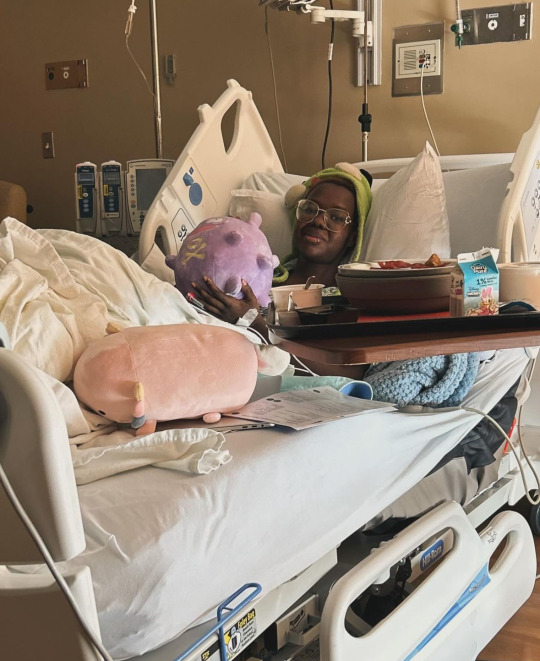
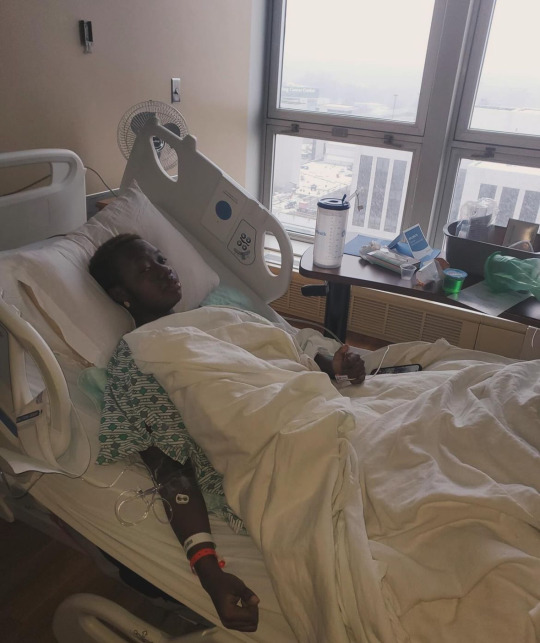
Hey guys, my friend Ayiko recently got diagnosed with colon cancer and needs help paying for his cancer treatments.
“*grey freeze frame* i’m sure you’re wondering how i got here—and for those of you who don’t know, i’m Ayiko, a 22 year old queer artist and musician. I’ve always been a creative, from theatre to a film major. My dream is to keep creating, to keep telling stories, to keep sharing my art with the world and with your help i’ll be able to continue with what i love, with my passions. On the night of February the 6th, what was thought to be a routine doctor visit for severe stomach pain turned into an in-patient hospital stay. A CT-Scan revealed the source of the pain was from a rare telescoping and entanglement of the intestines, known as Intussusception. After a successful colonoscopy relieved the pain, it also revealed a lump that was removed during the procedure. Further testing by the pathology department discovered that not only was the lump cancerous but there were additional tumors that were inaccessible without open surgery. The cancer had grown into 5cm tumors and had spread to some lymph nodes. On February the 17th i went under the knife(or in this case a laser) for a robotic colectomy to remove the remaining cancer. There was very little risk in it spreading and it was one of the least aggressive cancer of its type(Neuroendocrine Tumor of the Gastrointestinal Tract). After the surgery, i will be unable to lift more than 10 lbs or walk for long periods of time, which has left me unemployed. Now in post-recovery, i gently ask the community to rally behind my family and i as we face the financial burdens of hospital bills. As a first generation immigrant i am also aware of the family back home that my parents have to look after too(in fact my father is going to visit Uganda in less than a week). That’s why we would greatly appreciate donations of any amount, as i continue my recovery and face the possibility of chemotherapy. Just sharing the link can go a long way. Thanks for reading!” -Ayiko @pretty-roach
Currently donations are at 1.2k out of a 20k goal- any & all help is appreciated, please reblog to circulate.
2K notes
·
View notes
Text
General Mills and cheaply bought "dietitians" co-opted the anti-diet movement
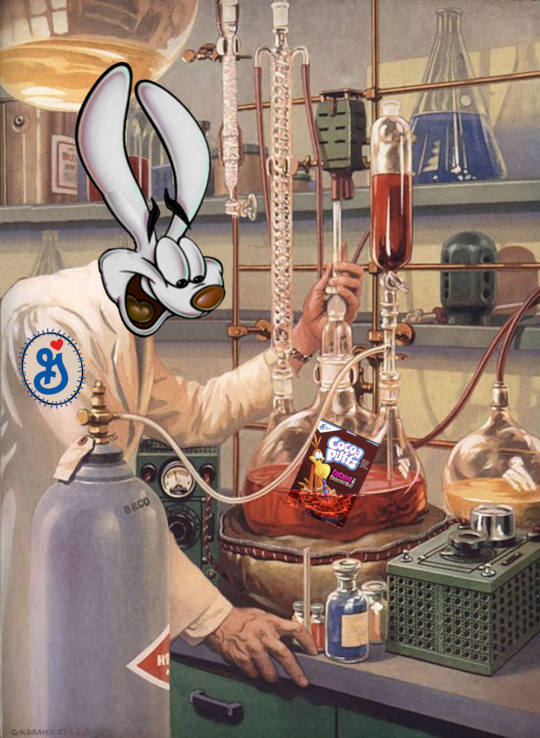
I'm on tour with my new, nationally bestselling novel The Bezzle! Catch me in NEXT THURSDAY (Apr 11) in BOSTON with Randall "XKCD" Munroehttps://cockeyed.com/lessons/viagra/viagra.html, then PROVIDENCE, RI (Apr 12), and beyond!

Steve Bannon isn't wrong: for his brand of nihilistic politics to win, all he has to do is "flood the zone with shit," demoralizing people to the point where they no longer even try to learn the truth.
This is really just a more refined, more potent version of the tactical doubt sown by Big Tobacco about whether smoking caused cancer, a playbook later adopted by the fossil fuel industry to sell climate denial. You know Darrell Huff's 1954 classic How To Lie With Statistics? Huff was a Big Tobacco shill (his next book, which wasn't ever published, was How To Lie With Cancer Statistics). His mission wasn't to help you spot statistical malpractice – an actual thing that is an actual problem that you should actually learn to spot. It was to turn you into a nihilist who didn't believe anything could be known:
https://pluralistic.net/2021/01/04/how-to-truth/#harford
Corporations don't need you to believe that their products are beneficial or even non-harmful. They just need you to believe nothing. If you don't know what's true, then why not just do whatever feels good, man? #YOLO!
These bannonfloods of shit are a favored tactic of strongmen and dictators. Their grip on power doesn't depend on their citizens trusting them – it's enough that they trust no one:
http://jonathanstray.com/networked-propaganda-and-counter-propaganda
Bannonflooding is especially beloved of the food industry. Food is essential, monopolized, and incredibly complicated, and many of the most profitable strategies for growing, processing and preparing food are very bad for the people who eat that food. Rather than sacrificing profits, the food industry floods the zone with shit, making it impossible to know what's true, in hopes that we will just eat whatever they're serving:
https://journals.plos.org/plosbiology/article?id=10.1371/journal.pbio.2003460
Now, the "nothing can be known" gambit only works if it's really hard to get at the truth. So it helps that nutrition and diet are very complex subjects, but it helps even more that the nutrition and diet industry are a cesspool of quacks and junk science. This is a "scientific discipline" whose prestigious annual meetings are sponsored (and catered) by McDonald's:
https://www.motherjones.com/environment/2014/05/my-trip-mcdonalds-sponsored-nutritionist-convention/
It's a "science" whose most prominent pitchmen peddle quack nostrums and sue the critics who point out (correctly) that eating foods high in chlorophyll will not "oxygenate your blood" (hint, chlorophyll only makes oxygen in the presence of light, which is notably lacking in your colon):
https://www.badscience.net/2007/02/ms-gillian-mckeith-banned-from-calling-herself-a-doctor/
When the quack-heavy world of nutrition combines with the socially stigmatized world of weight-loss, you get a zone ripe for shitflooding. The majority of Americans are "overweight" (according to a definition that relies on the unscientific idea of BMI) and nearly half of Americans are "obese." These numbers have been climbing steadily since the 1970s, and every diet turns out to be basically bullshit:
https://headgum.com/factually-with-adam-conover/what-does-ozepmic-actually-do-with-dr-dhruv-khullar
Notwithstanding the new blockbuster post-Ozempic drugs, we're been through an unbroken 50-year run of more and more of us being fatter and fatter, even as fat stigma increased. Fat people are treated as weak-willed and fundamentally unhealthy, while the most prominent health-risks of being fat are roundly neglected: the mental health effects of being shamed, and the physical risks of having doctors ignore your health complaints, no matter how serious they sound, and blame them on your weight:
https://maintenancephase.buzzsprout.com/1411126/11968083-glorifying-obesity-and-other-myths-about-fat-people
Fat people and their allies have banded together to address these real, urgent harms. The "body acceptance" movement isn't merely about feeling good in your own skin: it's also about fighting discrimination, demanding medical care (beyond "lose some weight") and warning people away from getting on the diet treadmill, which can lead to dangerous eating disorders and permanent weight gain:
https://www.beacon.org/You-Just-Need-to-Lose-Weight-P1853.aspx
Fat stigma is real. The mental health risks of fat-shaming are real. Eating disorders are real. Discrimination against fat people is real. The fact that these things are real doesn't mean that the food industry can't flood the zone with shit, though. On the contrary: the urgency of these issues, combined with the poor regulation of dietitians, makes the "what should you eat" zone perfect for flooding with endless quantities of highly profitable shit.
Perhaps you've gotten some of this shit on you. Have you found yourself watching a video from a dietitian influencer like Cara Harbstreet, Colleen Christensen or Lauren Smith, promoting "health at any size" with hashtags like #DerailTheShame and #AntiDiet? These were paid campaigns sponsored by General Mills, Pepsi, and other multinational, multibillion-dollar corporations.
Writing for The Examination, Sasha Chavkin, Anjali Tsui, Caitlin Gilbert and Anahad O'Connor describe the way that some of the world's largest and most profitable corporations have hijacked a movement where fat people and their allies fight stigma and shame and used it to peddle the lie that their heavily processed, high-calorie food is good for you:
https://www.theexamination.org/articles/as-obesity-rises-big-food-and-dietitians-push-anti-diet-advice
It's a surreal tale. They describe a speech by Amy Cohn, General Mills’ senior manager for nutrition, to an audience at a dietitian's conference, where Cohn "denounced the media for 'pointing the finger at processed foods' and making consumers feel ashamed of their choices." This is some next-level nihilism: rather than railing against the harmful stigma against fat people, Cohn wants us to fight the stigma against Cocoa Puffs.
This message isn't confined to industry conferences. Dietitians with large Tiktok followings like Cara Harbstreet then carry the message out to the public. In Harbstreet's video promoting Cinnamon Toast Crunch, Cocoa Puffs and Trix, she says, "I will always advocate for fearlessly nourishing meals, including cereal…Because everyone deserves to enjoy food without judgment, especially kids":
https://www.tiktok.com/@streetsmart.rd/video/7298403730989436206
Dietitians, nutritionists and the food industry have always had an uncomfortably close relationship, but the industry's shitflooding kicked into high gear when the FDA proposed rules limiting which foods the industry can promote as "healthy." General Mills, Kelloggs and Post have threatened a First Amendment suit against such a regulation, arguing that they have a free speech right to describe manifestly unhealthy food as "healthy."
The anti-diet movement – again, a legitimate movement aimed at fighting the dangerous junk science behind dieting – has been co-opted by the food industry, who are paying dietitian influencers to say things like "all foods have value" while brandishing packages of Twix and Reese's. In their Examination article, the authors profile people who struggled with their weight, then, after encountering the food industry's paid disinformation, believed that "healthy at any size" meant that it would be unhealthy to avoid highly processed, high calorie food. These people gained large amounts of weight, and found their lives constrained and their health severely compromised.
I've been overweight all my life. I went to my first Weight Watchers meeting when I was 12. I come from a family of overweight people with the chronic illnesses often associated with being fat. This is a subject that's always on my mind. I even wrote a whole novel about the promise and peril of a weight-loss miracle:
https://us.macmillan.com/books/9781429969284/makers
I think the anti-diet movement, and its associated ideas like body acceptance and healthy at every size, are enormously positive developments and hugely important. It's because I value these ideas that I'm so disgusted with Big Food and its cynical decision to flood the zone with shit. It's also why I'm so furious with dietitians and nutritionists for failing to self-regulate and become a real profession, the kind that censures and denounces quacks and shills.
I have complicated feelings about Ozempic and its successors, but even if these prove to be effective and safe in the long term, and even if we rein in the rapacious pharma companies so that they no longer sell a $5 product for $1000, I would still want dietary science to clean up its act:
https://jamanetwork.com/journals/jamanetworkopen/fullarticle/2816824
I'm not a nihilist. I think we can use science to discover truths – about ourselves and our world. I want to know those truths, and I think they can be known. The only people who benefit from convincing you that the truth is unknowable are the people who want to lie to you.

If you'd like an essay-formatted version of this post to read or share, here's a link to it on pluralistic.net, my surveillance-free, ad-free, tracker-free blog:
https://pluralistic.net/2024/04/05/corrupt-for-cocoa-puffs/#flood-the-zone-with-shit
#pluralistic#corruption#nutrition#food#diets#dieticians#nutritionists#junk science#junk food#astroturf#fat acceptance#fatphobia#health#nihilism#steve bannon#flood the zone with shit#general mills#dietitians
1K notes
·
View notes
Text
A review on the health effects of microplastics has some scientists suspecting the worst. The tiny synthetic particles that are found in our air, food, and water may be causing fertility issues, colon cancer, and poor lung function in humans, according to researchers at the University of California San Francisco (UCSF). Picking out some of the strongest evidence on microplastics published between 2018 and 2024, the team has identified several health risks to the digestive, reproductive, and respiratory systems of animals.
Continue Reading.
192 notes
·
View notes
Note
Hi sex witch!
I have been on the combination bc pill for almost 8 years, and I've been seeing a weird amount of stuff online lately talking about how allegedly dangerous birth control can be? How it increases the risk of some cancers, and how it can lead to blood clots mainly. I never really had a talk with my original prescribing doctor at all about side effects (a pediatrician who was a bit judgy about me having safe consensual sex at 17 and I dumped her ass for a wonderful GP).
I was always under the assumption that it 1. Was an extremely low risk. And 2. Was only really concerning if you had other risk factors (ie smoking), but I've been seeing a lot more scary shit about different birth control methods online lately (namely that and implants like nexplanon). Is it just fear mongering, or are these just medical risks we have to be willing to take to avoid pregnancy (another huge medical risk)?
Also follow up question, and I assume my current doctor would've said something if it was of concern, but you never know. Is it okay to be on the same hormonal birth control for as long as I have? Is there really a limit to it if you're only seeing benefits?
Thank you for all your work! o7
hi anon,
what a great question!
the risk factors affiliated with birth control and breast cancer are, indeed, extremely low. in many cases it's difficult to prove any correlation for certainty, and even in cases where some differences have been found between people who have taken hormonal birth control and those who haven't, the difference for those who have is still extremely small - even for folks who have been taking it for over ten years.
for the time being, the only people generally advised against using birth control for cancer-related are usually those already at high risk of breast cancer. it's also worth noting that hormonal birth control actually seems to slightly decrease the risk of ovarian, colon, and endometrial cancers!
the blood clot situation is similar. while some type of hormonal birth control can make blood clots slightly more likely, it still doesn't make them likely, and it's generally not a cause concern unless someone already has a preexisting issue with blood clots.
while there may be some very, very slightly increased risks in the long run, the same is true of any medication, and those risks don't generally compound enough over time to be cause of concern in the absence of any other complicating factors. if you and your healthcare provider have decided this is the best treatment for you, then by all means keep doing it!
fearmongering around contraception isn't new, and the goal behind it has always been restricting the options that people have to prevent pregnancy and control their bodies. one of my favorite (read: most hated) new variants are the crunchy woowoo influencers who try to claim that hormonal birth control is bad because it changes the natural rhythms of your body and fills you with toxins or whatever, to which I say alt spirituality wellness bullshit is barely a step away from healthcare misinformation and vaccine conspiracies and we really shouldn't be giving these people our time and attention. birth control is safe, it's effective, and it's necessary healthcare.
92 notes
·
View notes
Text
Errors, “Errors,” and Sci Fi
@strawberry-crocodile
tvtropes calls stuff like the wolf example "science matches on" which I think is a pretty fair shake
This. This is what’s got me thinking so much about errors. There’s a certain danger, here. A certain way that this particular effect — delicious dramatic irony — tempts the mind when reading old stories, even true ones.
What do you know about R.M.S. Titanic? I ask my class every year, and the first hand rises. “It was unsinkable,” the student inevitably says, and everyone is nodding, “or so they thought.” I write the word UNSINKABLE on the board, underneath my crude drawing of a ship with four smokestacks. It will be crossed out before the end of the hour, but not for the reason they expect.
“I find no evidence,” Walter Lord, preeminent biographer of the ship’s survivors, wrote, “that Titanic was ever advertised as unsinkable. This detail seems to have entered the collective mind so as to create a more perfect irony.” Indeed, historians’ examinations of White Star Line documents show the shipbuilders themselves worried it would be so large as to risk collision; they stocked several more lifeboats than 1910s regulations required.
The War to End All Wars (deep breath, satisfied exhale), also known as World War ONE. Chuckle. Shake of the head. What if I told you that this phrase, used primarily in American newspapers after the fact, wasn’t meant to be literal? Nowadays we’d say The Mother of All Wars, or One Hell of a Fucking War, but we wouldn’t mean literal motherhood, literal intercourse. What if I said the armistice and the Lost Generation and the Roaring 20s were all braced for another outbreak of European conflict, and yet we still failed to prevent it?
Did you know they were so confident in the safety of the S.S. Challenger that they put a civilian schoolteacher onboard? I do, because I’ve heard that one repeated many times. Only, see, it’s got the cause and effect reversed. Challenger launched on a day the shuttle’s engineers knew to be dangerously cold, because the first civilian in space was on board. And NASA knew its shuttle project would be cancelled entirely, if they couldn’t get that civilian’s much-delayed entry into space in the next two weeks. So they launched on a cold day, and killed her instead.
These are all what cognitive science calls Hindsight Bias on the personal level, what sociology calls Presentism on the cultural level. Social psychology’s a little of both, is primarily interested in why you’re sitting on your couch in a Colonize Mars shirt watching PBS and chuckling at the fools who believed in El Dorado. It wants to know why the mind flees straight from “marijuana will kill you” to “marijuana will cure cancer” without so much as a pause on the middle ground of its real benefits and drawbacks, its real (mild) risks and rewards.
And they can paralyze the sci-fi writer, if you think too much about them. Jetsons is futurist one decade, retro the next. “There are no bathrooms on the Enterprise,” the creators of Serenity say smugly, as if Gene Roddenberry should’ve simply known that decades later it’d be acceptable to show a man peeing in full view of the camera, nothing but the curve of the actor’s hand to protect his modesty. “No sound in space,” the Fandom Menace says, “No explosions in space,” and “A space station can’t collapse in zero-G.” Only then NASA burns a paper napkin outside of atmosphere, transmits music using only the ghost of nearby planets’ gravities, and logs onto Reddit long enough to point out the Death Star would implode in its own gravity field. And now we’re the ones pointing, the ones laughing, at those earlier point-and-laughers. Self-satisfied, smug in superiority. As if we did the work to find out ourselves, instead of just happening to be born a little later than George Lucas.
#errors#continuity#sci fi#presentism#star wars#titanic#world war i#science marches on#history#started a new post because i got waaaaaay off topic here#if you think the dinosaurs in Jurassic Park (1993) should've had feathers#you're a lot more ignorant about paleontology than the people you're trying to criticize#science was not handed down to us in its perfect complete form circa 1943#stop for a second before you call out someone else's reptilian denonychus#someone else's oxygenated moon#and ask: am i better read#or am i just more recently born?
2K notes
·
View notes
Text
A little bit of alcohol was once thought to be good for you. However, as scientific research advances, we’re gaining a clearer picture of alcohol’s effect on health—especially regarding cancer.
The complex relationship between alcohol and cancer was recently highlighted in a new report from the American Association for Cancer Research. The report’s findings are eye-opening.
The authors of the report estimate that 40 percent of all cancer cases are associated with “modifiable risk factors”—in other words, things we can change ourselves. Alcohol consumption being prominent among them.
Six types of cancer are linked to alcohol consumption: head and neck cancers, esophageal cancer, liver cancer, breast cancer, colorectal cancer, and stomach cancer.
The statistics are sobering. In 2019, more than one in 20 cancer diagnoses in the West were attributed to alcohol consumption, and this is increasing with time. This figure challenges the widespread perception of alcohol as a harmless social lubricant and builds on several well-conducted studies linking alcohol consumption to cancer risk.
But this isn’t just about the present—it’s also about the future. The report highlights a concerning trend: rising rates of certain cancers among younger adults. It’s a plot twist that researchers like me are still trying to understand, but alcohol consumption is emerging as a potential frontrunner in the list of causes.
Of particular concern is the rising incidence of early-onset colorectal cancer among adults under 50. The report notes a 1.9 percent annual increase between 2011 and 2019.
While the exact causes of this trend are still being investigated, research consistently shows a link between frequent and regular drinking in early and mid-adulthood and a higher risk of colon and rectal cancers later in life. But it’s also important to realize this story isn’t a tragedy.
It’s more of a cautionary tale with the potential for a hopeful ending. Unlike many risk factors for cancer, alcohol consumption is one we can control. Reducing or eliminating alcohol intake can lower the risk, offering a form of empowerment in the face of an often unpredictable disease.
The relationship between alcohol and cancer risk generally follows a dose-response pattern, meaning simply that higher levels of consumption are associated with greater risk. Even light to moderate drinking has been linked to increased risk for some cancers, particularly breast cancer.
Yet it’s crucial to remember that while alcohol increases cancer risk, it doesn’t mean everyone who drinks will develop cancer. Many factors contribute to cancer development.
Damages DNA
The story doesn’t end with these numbers. It extends to the very cells of our bodies, where alcohol’s journey begins. When we drink, our bodies break down alcohol into acetaldehyde, a substance that can damage our DNA, the blueprint of our cells. This means that alcohol can potentially rewrite our DNA and create changes called mutations, which in turn can cause cancer.
The tale grows more complex when we consider the various ways alcohol interacts with our bodies. It can impair nutrient and vitamin absorption, alter hormone levels, and even make it easier for harmful chemicals to penetrate cells in the mouth and throat. It can affect the bacteria in our guts, the so-called microbiome, that we live with and is important for our health and well-being.
Alcohol consumption is also linked to other aspects of our own health and lifestyle and it’s important not just to consider this alone. Tobacco use and smoking, for instance, can significantly amplify the cancer risks associated with alcohol. Genetic factors play a role too, with certain variations affecting how our bodies metabolize (break down) alcohol.
Physical inactivity and obesity, often associated with heavy drinking, also separately increase cancer risks but on top of alcohol makes this much worse. Despite this, misconceptions persist. The type of alcoholic beverage, be it beer, wine, or spirits, doesn’t significantly alter the cancer risk. It’s the ethanol (the chemical name for alcohol) itself that’s carcinogenic (cancer-causing).
And while some studies have suggested that red wine might have protective effects against certain diseases, there’s no clear evidence that it helps prevent cancer.
The potential risks of alcohol consumption probably outweigh any potential benefits. The takeaway is not that we should never enjoy a glass of wine or a beer with friends. Rather, it’s about being aware of the potential risks and making choices that align with our health goals. It’s about moderation, mindfulness, and informed decisionmaking.
Alcohol has lots of effects not just in terms of causing cancer. A recent large study of more than 135,000 older drinkers in the UK has shown that the more people drink, the higher the risk of death from any cause.
These and similar findings underscore the importance of public awareness and education about the potential risks associated with alcohol consumption. As our understanding of the alcohol-cancer link grows, it becomes increasingly clear that what many consider a harmless indulgence may have more significant health implications than previously thought.
Unfortunately, not many people appear to be aware of these risks. In the US, around half of people don’t know that alcohol increases the risk of cancer. Clearly, a lot of work needs to be done to overcome this lack of awareness.
128 notes
·
View notes
Text
Get more sun!
The mental and physical benefits of getting sun every day include but are not limited to:
Vitamin D production: Sunlight is the primary source of vitamin D, a nutrient that is essential for healthy bones and teeth, as well as immune system function and mental health.
Improved mood: Sunlight exposure triggers the release of serotonin, a hormone that can help improve mood and reduce symptoms of depression and anxiety.
Regulation of circadian rhythm: Exposure to sunlight can help regulate the body's natural sleep-wake cycle, leading to better sleep and overall health.
Reduced inflammation: Sunlight exposure has been shown to reduce inflammation in the body, which can help reduce the risk of chronic diseases such as heart disease and diabetes.
Improved immune function: Vitamin D produced by the body in response to sunlight exposure plays a critical role in immune function, helping to protect against infections and disease.
Lowered blood pressure: Exposure to sunlight has been shown to lower blood pressure, which can reduce the risk of heart disease and stroke.
Improved cognitive function: Sunlight exposure has been shown to improve cognitive function, including memory, attention, and processing speed.
Better bone health: Vitamin D produced in response to sunlight exposure plays an essential role in bone health, helping to prevent conditions such as osteoporosis.
Reduced risk of certain cancers: Sunlight exposure has been linked to a reduced risk of certain types of cancer, including breast, colon, and prostate cancer.
Improved skin conditions: Sunlight exposure can improve skin conditions such as acne, psoriasis, and eczema, as well as improve the appearance of fine lines and wrinkles.
Enhanced physical performance: Sunlight exposure can increase endurance and physical performance, as well as improve muscle strength and flexibility.
Increased energy: Sunlight exposure can increase energy levels, helping to combat fatigue and improve overall productivity.
The amount of sun exposure needed varies depending on several factors, such as skin type, time of day, geographic location, and the season. However, in general, it's recommended to get about 10-30 minutes of sun exposure daily, ideally in the morning or late afternoon when the sun's UV rays are not as strong.
#healthy lifestyle#health tips#health and wellness#self confidence#self care#high value mindset#high value woman#high value men#personal development#level up journey#self love journey#health is wealth
920 notes
·
View notes
Text
i did get a big jolt in this video when he says that he was at higher risk of lymphoma due to medication and having an autoimmune disease because i was like Oh. BUT WE HAVE THE SAME THING?
i can't believe just yesterday i was congratulating hank green on twitter for being in remission for ulcerative colitis and then just today i'm learning he has cancer :( universe cant give this guy a break i guess he just traded one thing for another sob😭
#hank green is like forever on my +1 list for being one of the few 'celebrities' who has ulcerative colitis#idk if i have lymphoma risk ? i know i have skin cancer risk because of imuran which is why i go to a derm regularly#since it happens to uh. be a very deadly type-#and i know i have a colon cancer risk due to just. increased repeated internal trauma#which mildly worries me because colon cancer symtoms look exactly like my regular symptoms#so would i even be??? recognizing it??#and that's why we have regular colonoscopies to check that out!#i havent had one since 2015 though so like. tragically. TRAGICALLY. i should probably get one soon#they suck sooooo bad yall. colonoscopies suck so bad#they arent painful for the record and the recovery time is just like. a few hours.#the prep just makes me want to gag#cancer tw#sorry maybe that should be on the main post...
16 notes
·
View notes
Note
Hey babe, wanna hear something hot? *whispers* history of metformin
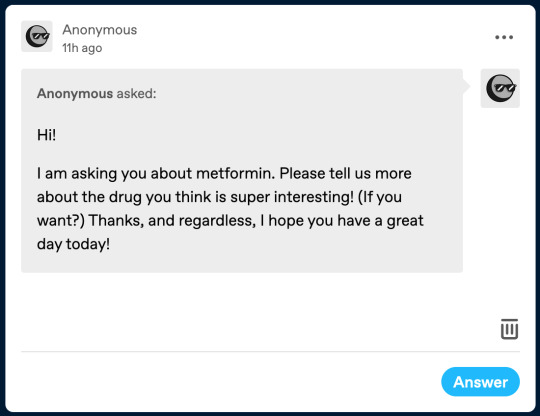
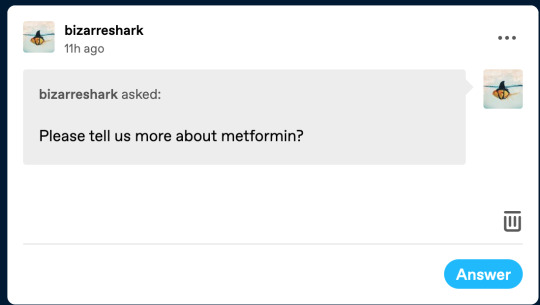
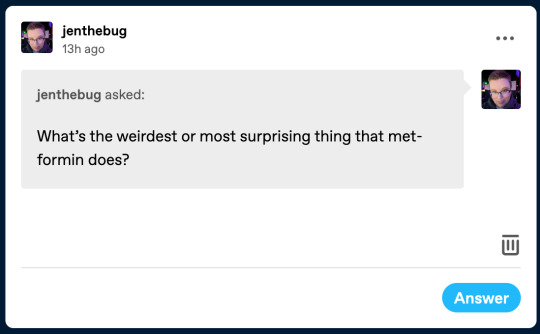

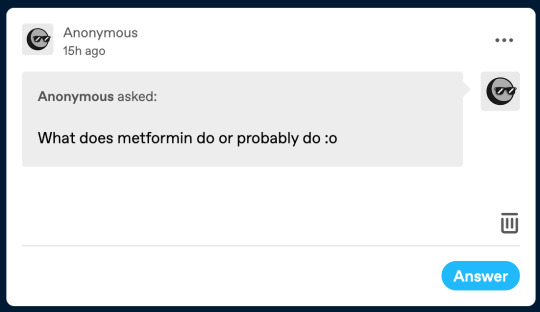
Ok okay I'll talk
So metformin is commonly thought of as the most boring of diabetes drugs. Like, everyone who has ever thought about maybe having type 2 diabetes is taking it unless it gives them diarrhea, and even then their doctor still probably wants them to take it. But it's a first line because it's old, it's cheap, it doesn't often cause hypoglycemia, and it has relatively few side effects compared to other diabetes drugs. Also, like a lot of older drugs, it does way more than it says on the packaging. And a lot of stuff we're still learning about.
In order to talk about metformin, we have to talk about a plant called goat's rue. Goat's rue is a plant native to Europe, Africa, and Asia, and currently grows just about everywhere. In ancient times it was used as an anti-parasitic, a plague remedy, and to relieve the excessive urination caused by what might have been diabetes. In 1918 it was found to contain a chemical called galegine, which did lower blood sugar. Galegine as an anti-diabetes medication is probably too toxic to use long term. However, with a few chemical tweaks, it could become a drug that lowered blood sugar without the toxic effects. Metformin was born.
Metformin came out in 1923 and is a type of drug called a biguanide. it's actually the only type in it's class still available as an anti-diabetic agent, because the other drugs in it's class that came out in the 1920s and 30s caused lactic acidosis and liver problems (similar to the types of reactions seen with galegine), and were taken off the market.
Metformin (and pretty much all oral antidiabetic agents in development at this time) didn't do well initially, probably because they came out the same decade as insulin, and insulin was a lot more effective at treating any kind of diabetes.
It fell out of use extremely quickly, and didn't get picked up again until the 1940s, when US access to antimalarial drugs was cut off, just as a war in the pacific was ramping up. Metformin was evaluated as an antimalarial during WWII, and while noted to have some anti-malarial properties (particularly as a malaria preventative) it also was noted to significantly lower blood sugar in diabetic patients- while not lowering blood sugar very much at all in non-diabetic patients.
This effect, rather than it's antimalarial properties, was what got scientists really interested. Unfortunately, it would not be until 1957 in France that metformin had its first major studies to determine that it did, indeed, work against diabetes. Metformin lost the race to the "first" (successful) oral antidiabetic agent by a year, to a different drug that was found while looking for a new antibiotic- Diabenese.
Metformin became a commercial success in France, while Diabenese became successful in the United States. Metformin would actually not be approved for use in the US until 1995.
But now we get to talk about what metformin does and why it's so freaking cool.
Type 2 Diabetes- lowers A1C (a measure of blood sugar control) by 1-2 full points
Prevents/reverses weight gain due to antipsychotics
Prevents and treats malaria
Makes the flu shot work better
Decreases severity of respiratory illness and complications related to the flu
Changes gut microbiome for the better
Regulates periods and reduces other symptoms in people with PCOS
Lowers risk of breast, colon, and prostate cancer
Lowers risk of dementia
Lowers risk of stroke
May increase lifespan
127 notes
·
View notes